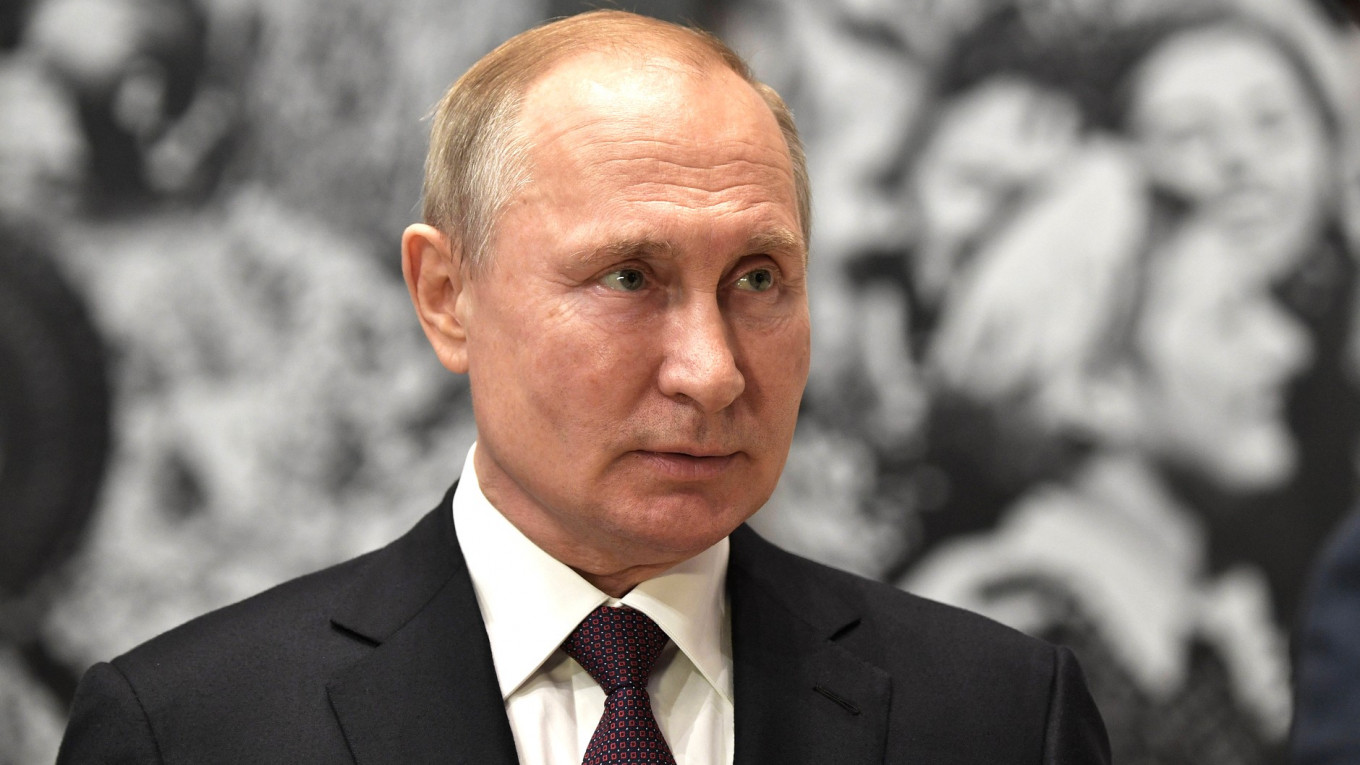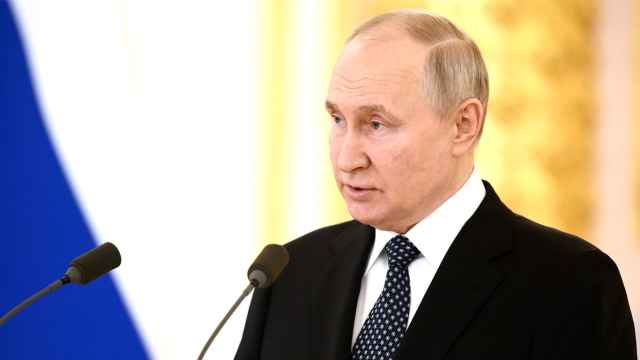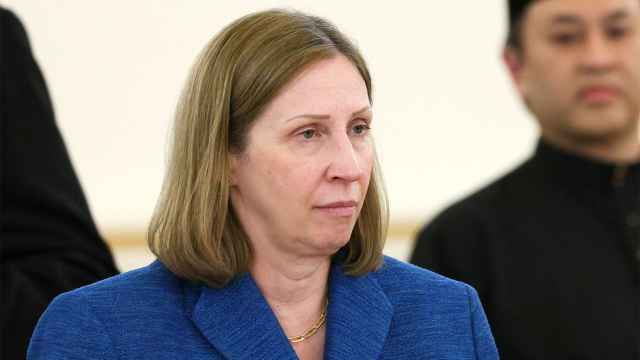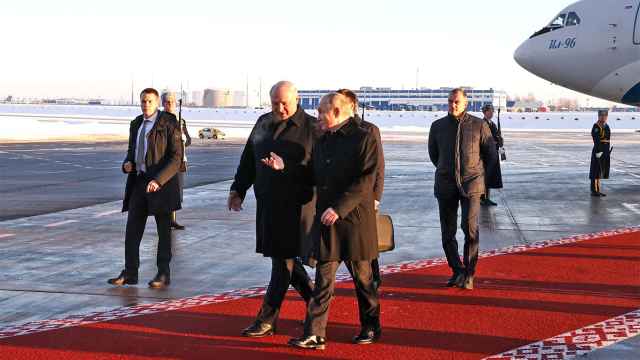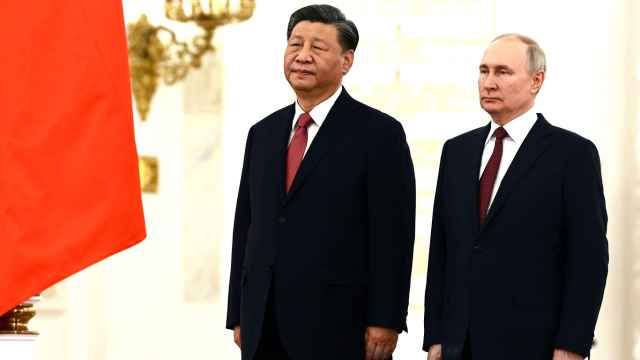No dictator rules without a nation’s acquiescence, but in Russia in 2019, President Vladimir Putin has found that acceptance increasingly reluctant. His reaction: an increasing reliance on the stick as the carrot harvest fails to come in.
Putin discovered in 2018 that the world could be easier for him to manipulate than his own country. As the geopolitical architecture he started creating with the 2014 Crimea annexation took shape, his popularity at home took a dive — thanks to a necessary but highly unpopular pension reform, including a steep increase in the retirement age. Protest activity spiked. By the end of last year, Putin had resolved to tear his eyes away from the world map and look toward the Russian heartland, where the pro-Kremlin United Russia party had suffered some painful electoral defeats.
This year, however, Putin’s effort to win back Russia’s affection has been unsuccessful. This affects the prospects of a smooth power transition in 2024, when he is supposed to step down because of the constitutional term limit.
In late 2018, Putin and his foreign-policy advisers made it clear that they considered any kind of firm international order gone. In such a world, global leaders protect what they see as national interests on a transactional basis, building no firm alliances and instead making it clear why others might find it to their advantage to cooperate with them in specific areas. This year, Russia’s offering in the geopolitical marketplace coalesced.
Russia’s previous bet was on its vast energy resources — in the 2000s, as the oil price spiked, there was even talk of the country becoming an “energy superpower.” In 2019, this old strategy began bearing fruit. Gazprom PJSC, the gas-export monopoly the Kremlin uses to project its energy power (and enrich Putin’s friends through infrastructure contracts), completed two major pipelines: the offshore part of TurkStream, crossing the bottom of the Black Sea to Turkey, and Power of Siberia, bringing Russian natural gas to China. Though the construction of Nord Stream 2 under the Baltic Sea to Germany has been slowed down by European regulatory obstacles, inclement weather and perhaps by belated U.S. sanctions, it will be completed next year. Then Putin’s old scheme for making Russia indispensable to key neighbors (the Balkan nations, China, Germany and Turkey) will be complete, too.
Besides, the European Union, Russia’s key energy export market, is aiming for carbon neutrality by 2050 with an ambitious plan to develop renewable energy sources. Sooner or later, China, too, will start phasing out fossil fuels. Russia’s long-term strategy needs to be based on something other than hydrocarbon exports.
Putin now appears to have found that something, and a way to package it as an offering: The agile use of military force and what’s come to be known as hybrid capabilities — hacking, propaganda, diplomacy — in support of beleaguered incumbents who are mostly considered undesirable by the West.
The Russian-engineered victory of President Bashar al-Assad in Syria is the window display for this offering. But Putin also can nod toward Venezuelan President Nicolas Maduro’s ability to retain power, even though the West has recognized his challenger as the nation’s legitimate leader and the U.S. has hit him with powerful sanctions. Russian support never rose to the level of a military operation, but it has helped sustain the Maduro regime even as Venezuelans fled in droves from the economic hardship it has inflicted on them.
Putin’s offer of support to regimes considered rogue under the old, U.S.-led international order harks back to the Romanov czars’ policy of unconditionally supporting monarchies against revolutions. It has made Putin some important friends. One is Turkish President Recep Tayyip Erdogan, who purchased Russian S-400 anti-aircraft systems, defying U.S. pressure to cancel the deal. Another is Saudi Crown Prince Mohammad bin Salman, who retained a cordial relationship with Putin as the Western world boiled up about the his apparent role in the murder of dissident journalist Jamal Khashoggi. This year, Russia developed a cooperative relationship with Turkey in Syria, and its cooperation with Saudi Arabia has been a major factor for the global oil price.
Putin has also started openly marketing his offering to African nations: In October, he gathered several dozen African leaders in Sochi to signal that Russia could be called on to help settle disputes in exchange for natural-resource concessions. Russian mercenaries have shown up in the Central African Republic, Libya and Sudan.
Unexpectedly, Putin’s transactional worldview has found some intellectual followers in Europe, most notably French President Emmanuel Macron, who openly questioned Europe’s transatlantic relationship and suggested that a cautious rapprochement with Russia was in order. Macron is no Putin ally, but he’s clearly turning into a like-minded thinker concerning the absence of a world order worth defending. And Putin isn’t looking for allies, anyway — just for means to assert Russia’s global role.
But the growing acceptance of Putin’s geopolitical thinking hasn’t converted yet into any practical benefits for the Kremlin, such as the softening of European sanctions, a lasting solution to the Ukraine crisis, or substantial economic dividends from the Middle East and Africa. And that feeds into Putin’s domestic problem, which is primarily economic.
It’s clear, however, that this year, the projects will end up seriously underfunded. Alexey Kudrin, head of Russia’s budgetary watchdog, the Accounting Chamber, met with Putin this week to tell him that only 67% of the planned 2019 funding for the projects had been released by November. On some, have barely used any of the allocated funds have been spent. The money is there, but the bureaucrats administering the programs are too cautious to dispense it. According to Kudrin, this year, up to a trillion rubles ($16 billion) allocated under the Russian federal budget will remain unspent.
“No, no, that sounds like a lot,” was Putin’s reaction to Kudrin’s data. But the funding bottleneck is obvious. In a system geared to achieve growth through government investment, while private initiative is distrusted and often suppressed, public funding isn’t flowing because the risks of Russia’s harsh law-enforcement system are too high for people in charge of that funding.
In part because of this, and in part because Russia’s problems can’t really be solved with government money, 2019 has been a dismal year for the “national goals” set by Putin for his current presidential term. According to the Accounting Chamber, Russia actually moved away from some of these goals.
Other goals, such as steadily increasing real incomes, appear to have been reached with the help of statistical sleight of hand. In the third quarter of 2019, real incomes reported by the government — based on a recently-updated methodology — suddenly jumped 3% year on year, with many economists doubting the underlying data.
Putin can no longer hope to keep shaping Russians’ perceptions of their country’s condition, and of their own, through propaganda. In May, Mediascope, a media measurement company whose data are used by advertisers in Russia, reported that the internet, for the first time, had a bigger audience in Russia’s cities than TV.
Yes, young people the world over watch less TV and spend more time on the internet. But in Russia, this is particularly important because TV is a state-controlled propaganda machine, and the internet, despite the presence of pro-Kremlin troll farms and increasing censorship and surveillance, is still largely a free forum. No wonder younger Russians have been the driving force of this year’s protests, notably in Moscow over the summer, after the pro-Putin mayor prevented a number of anti-Putin candidates from running in a municipal election, but also in other places such as the Arkhangelsk Region in northern Russia, where locals have been fighting the creation of a gigantic landfill.
Protest activity in Russia has dropped off somewhat since its peak after the pension reform was announced, but it hasn’t dipped back to the level of 2017. According to the Center for Social and Legal Rights, 207 of the 581 protests held in the third quarter of 2019 were of a political nature, and 149 were environmental.
Putin’s reaction was to crack down. A number of participants in the Moscow protests were sentenced to prison terms or given suspended sentences for offenses such as throwing empty plastic bottles at fully-equipped riot police. Putin explained his support for the harsh punishments during a recent meeting with his Human Rights Council, which he purged of potentially disloyal liberals this year:
“He tosses a plastic cup at a representative of authority. Nothing happens. Then a plastic bottle — nothing happens. So he’ll toss a glass bottle, then a stone, and then people will start shooting and looting stores. We must not allow this kind of thing.”
This willingness to punish people before they become truly dangerous is in line with Putin’s other moves this year. He signed the Russian version of a lese majeste law, and numerous people have been fined for insulting the president online. He also approved a law making it possible to designate people as “foreign agents” for sharing articles from media funded by foreign governments or for working for foreign-funded organizations.
Putin is trying to make his regime coup-proof by creating a kind of early-warning system regarding citizens who consider protesting for political, economic or environmental reasons— about a quarter of the country’s adult population, according to pollster Levada Center. The tactic says a lot about Putin’s skill, experience and foresight as a repressive leader, but it hardly boosts his popularity. Though Putin’s approval rating technically is near 70%, Russian poll data are distorted by the unwillingness of ordinary people to criticize the authorities to strangers; the current approval rating is nonetheless near historic lows.
In “Putin v. the People” — in my view, the most insightful book on Russian politics published this year — Graeme Robertson and Samuel Greene wrote that Putin’s popularity is “the only thing holding the ship together” for the Kremlin regime. That means, they went on:
“When position and power depend heavily on the citizens — on their reading of their social surroundings, their sense of consensus, and the breadth of their imaginations — this support can disappear almost overnight. Putin’s power will crumble when we least expect it. “
If Putin understands that, and I suspect he does, his persistent inability to improve his ratings must be an important factor in his thinking ahead to 2024. Should he try to stick around by some trick, or should he try to hand over power to a trusted successor, as he did with Dmitry Medvedev in 2008?
The former scenario is complicated by a dearth of options. For example, the Kremlin has put pressure all year on neighboring Belarus to move toward a merger with Russia — a scheme that could install Putin as leader of the new combined entity, without the need to change the Russian constitution. But Putin’s meeting earlier this month with Belarussian President Alexander Lukashenko ended without any progress. Lukashenko has successfully staved off a merger deal, which is unpopular in Belarus, despite his authoritarian regime’s economic dependence on Russia.
The handover scenario, for its part, looks iffy if Putin risks becoming less popular than the successor. Earlier this year in Kyrgyzstan, the ex-president tried to grab back power from a chosen successor who’d fallen out of line, but was thwarted and imprisoned because he’d miscalculated his support.
Keeping the enforcement apparatus well-funded and devising a way to cling to power after his term ends appear to be Putin’s best option if Russia is to continue down the path on which he set it — and if he, his family and friends are to live happily beyond 2024. Putin would no doubt prefer being loved for his successful economic policies, but if this year is any indication, that’s the least likely scenario of all.
This article was first published by Bloomberg.
A Message from The Moscow Times:
Dear readers,
We are facing unprecedented challenges. Russia's Prosecutor General's Office has designated The Moscow Times as an "undesirable" organization, criminalizing our work and putting our staff at risk of prosecution. This follows our earlier unjust labeling as a "foreign agent."
These actions are direct attempts to silence independent journalism in Russia. The authorities claim our work "discredits the decisions of the Russian leadership." We see things differently: we strive to provide accurate, unbiased reporting on Russia.
We, the journalists of The Moscow Times, refuse to be silenced. But to continue our work, we need your help.
Your support, no matter how small, makes a world of difference. If you can, please support us monthly starting from just $2. It's quick to set up, and every contribution makes a significant impact.
By supporting The Moscow Times, you're defending open, independent journalism in the face of repression. Thank you for standing with us.
Remind me later.



